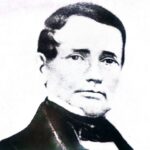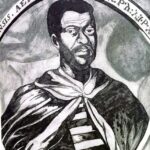MBIDI, KILUWE
- 2 Min Read
Mbidi Kiluwe (who flourished circa 1500), also known as Ilunga Mbili, a hero in Luba oral tradition, is thought to have introduced “bulopwe”, the unique power of kinship, to the ruling Luba dynasty. Although many Luba regard Mbidi Kiluwe as a historical figure, he can best be regarded as a symbol of political authority and courtly ritual.
According to tradition, Mbidi Kiluwe came from the Lake Mweru region in the east, although his precise origins were obscure. Supposedly, he was the son of a powerful chief, Ilunga Kiluwe, who had two other children, a son, Ndala, and a daughter, Mwanana. Because Mwanana was very dear to her father, he designated her as his successor, rather than his son Mbidi Kiluwe who had popular support.
Mwanana owned a domesticated lion, which Mbidi Kiluwe accidentally allowed to escape. Furious, Mwana threatened to have him killed if he did not return her lion. Therefore, Mbidi Kiluwe, who was also a hunter, set out westwards to find the lion. Having lost the beast’s track, he stopped in the forest located between the Lualaba and Lubilash rivers to hunt. There, he met the two half-sisters of the Luba ruler Nkongolo. The sisters fell in love with the stranger and took him to their brother’s court.
With hesitation, Nkongolo welcomed the hunter. Nkongolo was fearful because a seer had told him the visitor would introduce the customs of anointed royalty to the realm. This royal innovation, symbolised by the new culinary ritual of eating in private, was not accepted gracefully by Nkongolo. Vexed, the visitor decided to leave the court of Nkongolo, despite the fact that earlier he had married Nkongolo’s two half-sisters. Thus, he returned to the east from whence he came.
Despite Mbidi Kiluwe’s departure, the prediction of Nkongolo’s seer son was soon realised. A child, Kalala Ilunga, was born of the union between Mbidi Kiluwe and Bulanda, one of Nkongolo’s sisters. When he grew up, Kalala Ilunga fulfilled the earlier prophecy by overthrowing Nkongolo, establishing a new dynastic line, and expanding the Luba political domain.
NDAYWEL e NZIEM





